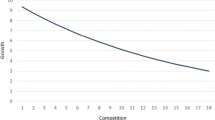Abstract
Despite the short-run elements in his work, Schumpeter succeeded in drawing economists back in the other direction. This paper examines Schumpeter’s formal, analytical micro-model of entrepreneurship and innovation, which laid the groundwork for a workable micro-model of the long-run growth process. Schumpeter’s enduring work continues to guide effective policy, though concern for the general welfare permits neither the long run nor the short run to be ignored.
Similar content being viewed by others
Notes
Incidentally, they also shared common ground in the lukewarm reception they originally offered Keynes’ General Theory, though Viner subsequently softened his reservations and Robbins revised his conclusions altogether after his work with Keynes during World War II and their partnership in negotiations with the Americans.
Cantillon clearly did not introduce the term into the English language in his book, which survives in its entirety only in the French translation. What we do know of the original English version is found in Postlewaite’s plagiarized passages, which clearly refute the oft repeated attribution of the term to Cantillon.
References
Astebro T (2003) The return to independent invention: evidence of unrealistic optimism, risk seeking or skewness loving. Econ J 113:226–238
Baumol WJ (2010) The microtheory of innovative entrepreneurship. Princeton University Press, Princeton
Benz M, Frey BS (2004) Being independent raises happiness at work. Swedish Econ Policy Rev 11:95–134
Cantillon R (1755, reprinted 1931). In: Higgs H (ed) Essai sur la Nature du Commerce en Général. Macmillan, London
Clark JB (1899, reprinted 1927) The distribution of wealth: a theory of wages, interest and profits. The Macmillan Company, New York
Kirzner IM (1979) Perception, opportunity and profit. University of Chicago Press, Chicago
Keynes JM (1930) Economic possibilities for our grandchildren. In: Essays in persuasion. Macmillan, London
Knight FH (1921) Uncertainty and profit. Houghton Mifflin, Boston
Marx K (1986). In: Elster J (ed) Karl Marx: a reader. Cambridge University Press, Cambridge
Nordhaus WD (2004) Schumpeterian profits in the American economy: theory and measurement, Working Paper 10433. National Bureau of Economic Research, Cambridge
Ricardo D (1821) Principles of political economy and taxation, 3rd edn. London
Schumpeter JA (1911, English edition 1936) The theory of economic development. Harvard University Press, Cambridge
Schumpeter JA (1942, reprinted 1947) Capitalism, socialism and democracy. Harper & Brothers, New York
Schumpeter JA (1954) History of economic analysis. Taylor & Francis, London
Smith A (1776, Canan edition) An inquiry into the nature and causes of the wealth of nations. Modern Library, New York
van der Sluis J, van Praag M, van Witteloostuijn A (2006) Why are the returns to education higher for entrepreneurs than employees. University of Amsterdam Working Paper
Author information
Authors and Affiliations
Corresponding author
Additional information
I am grateful to the editors for giving me the opportunity to join in this tribute to Mark Perlman. Hewas a good friend and a valued colleague, to whom so many of us are so deeply indebted. I also mustthank the Ewing Marion Kauffman Foundation for its generous support of my work in the area of thispaper. Finally, I must confess that a portion of the title, “the long run and the short”, is borrowed fromthe title I gave to a collection of superb Jacob Viner articles, which I edited anonymously in honor ofone of his particularly important birthdays. Now that he is so many years no longer with us, thereseems little reason to retain the secret.
Rights and permissions
About this article
Cite this article
Baumol, W.J. Joseph Schumpeter: the long run, and the short. J Evol Econ 25, 37–43 (2015). https://doi.org/10.1007/s00191-013-0327-3
Published:
Issue Date:
DOI: https://doi.org/10.1007/s00191-013-0327-3




